Hardly achievable, really. The US did oppose Japan earlier already, relations would be icy even with a democratic Japan. Furthermore, why on earth would the USA give up their isolationism and join they Allies in this scenario anyway? Even FDR would have a very hard time dragging his country in a war in this scenario.
Teikoku no eiko (Imperial Glory) - A Japanese HOI3:SF (HPP) AAR
- Thread starter HecNev
- Start date
-
We have updated our Community Code of Conduct. Please read through the new rules for the forum that are an integral part of Paradox Interactive’s User Agreement.
You are using an out of date browser. It may not display this or other websites correctly.
You should upgrade or use an alternative browser.
You should upgrade or use an alternative browser.
The US would probably stay isolationist with no threat, that's true. But if they get involved, I doubt they would support China.
Yes, I don't think there is any reason for the USA to get involved or to support China. They may not entirely trust Japan, but a democratic Japan that has formally aligned itself with the European democracies shouldn't seem threatening to them.
The US and Japan saw each other as rivals all throughout the 1920s and 1930s. Even before Japan became a dictatorship! (Which only happened soemwhere in the mid 1930s IIRC) However that was when China was seen as weak, as unable to stand for itself - the US opposed Japan's desire to extend its power over China because they wanted China as a preferred trading partner (or exploitation victim, depending on who you ask) for US business interests.SSmith said:Yes, I don't think there is any reason for the USA to get involved or to support China. They may not entirely trust Japan, but a democratic Japan that has formally aligned itself with the European democracies shouldn't seem threatening to them.
In this scenario, whether US-Japanese relations are hostile or just cold would depend on what China is doing.
- If China is serious on joining the Axis it might wish to marginalize US business interests. In this case the US would stop seeing Japan as a rival, and Japan would be (more or less) free to do what it wants, as long as it respects what remains of US interests in China.
- If however China regards the US as a neutral power and continues to seek closer ties with the US, then the US-Japanese relations will remain icy. The US will not want Japan to endanger US interests in China, regardless of China's foreign policies. As long as China remains at peace, I don't think the US would care whose ambassadors Chiang Kai-Chek entertains in his palace - even if it's the German and Italian ambassadors. The US will want Japan to stay out of China.
- Fascinating complications will start if war breaks out between the Axis and the Allies - will China join Germany and Italy? This would make it difficult for the US. US and UK are lukewarm friends, but what will Roosevelt do if Chiang Kai-Chek invades Hong Kong and French Indochina?? Stay neutral, and seriously piss UK/France off? Or move away from Chiang, and lose their business priviledges? In any case this would be good for Allied Japan, they can tell the US "look how evil Chiang is, attacking our jolly friends the Brits!" and invade China in the name of democracy.
The funniest scenario would probably where the US gets close to the Axis powers, and joins them at some point in 1942 or 1943.
I may be mistaken but I think China is already in the Axis in this AAR, so probably your first scenario holds. Yes, I'm sure Japan and US will continue to be rivals and that would seem entirely natural since they are the two great Pacific powers.
Now that's quite a discussion going on here 
So, let my bring some light into the darkness
Currently, it seems like the "funniest scenario" is quite likely to happen.
Still, I do think it will be difficult for them to join the war, as I don't intend to do a Pearl Harbor. It is more likely that they will be dragged into the war because they join the Axis at some point of time.
Yes, China is already an Axis member.
The USA are far from joining the Allies. In fact, they are continuously drifting towards the Axis, even with diplomatic influence of the UK.
If they will join the war and when they will do so is still a mystery.
Also, they are nice trading partners, i.e. they have no problem doing business with me.
So, let my bring some light into the darkness
The US and Japan saw each other as rivals all throughout the 1920s and 1930s. Even before Japan became a dictatorship! (Which only happened soemwhere in the mid 1930s IIRC) However that was when China was seen as weak, as unable to stand for itself - the US opposed Japan's desire to extend its power over China because they wanted China as a preferred trading partner (or exploitation victim, depending on who you ask) for US business interests.
In this scenario, whether US-Japanese relations are hostile or just cold would depend on what China is doing.
- If China is serious on joining the Axis it might wish to marginalize US business interests. In this case the US would stop seeing Japan as a rival, and Japan would be (more or less) free to do what it wants, as long as it respects what remains of US interests in China.
- If however China regards the US as a neutral power and continues to seek closer ties with the US, then the US-Japanese relations will remain icy. The US will not want Japan to endanger US interests in China, regardless of China's foreign policies. As long as China remains at peace, I don't think the US would care whose ambassadors Chiang Kai-Chek entertains in his palace - even if it's the German and Italian ambassadors. The US will want Japan to stay out of China.
- Fascinating complications will start if war breaks out between the Axis and the Allies - will China join Germany and Italy? This would make it difficult for the US. US and UK are lukewarm friends, but what will Roosevelt do if Chiang Kai-Chek invades Hong Kong and French Indochina?? Stay neutral, and seriously piss UK/France off? Or move away from Chiang, and lose their business priviledges? In any case this would be good for Allied Japan, they can tell the US "look how evil Chiang is, attacking our jolly friends the Brits!" and invade China in the name of democracy.
The funniest scenario would probably where the US gets close to the Axis powers, and joins them at some point in 1942 or 1943."Against Bolshevism and the Japanese menace! For business and profits!"
Currently, it seems like the "funniest scenario" is quite likely to happen.
Still, I do think it will be difficult for them to join the war, as I don't intend to do a Pearl Harbor. It is more likely that they will be dragged into the war because they join the Axis at some point of time.
I may be mistaken but I think China is already in the Axis in this AAR, so probably your first scenario holds. Yes, I'm sure Japan and US will continue to be rivals and that would seem entirely natural since they are the two great Pacific powers.
Yes, China is already an Axis member.
The USA are far from joining the Allies. In fact, they are continuously drifting towards the Axis, even with diplomatic influence of the UK.
If they will join the war and when they will do so is still a mystery.
Also, they are nice trading partners, i.e. they have no problem doing business with me.
Chapter 14
On the 25th of December, the Republic of China officially declared war upon the Yunnan and Guangxi Cliques in order to make another step towards the unification of their country. Being an Axis member, they did also call the other Axis-nations to this war.
Japan considered this to be a major threat to its long-term safety.
As China started to expand into the warlord’s countries two day later, the IJA was mobilized and the IJN brought within striking distance of the Chinese coast.
Negotiations with the British and the French had been made to ensure their support.
Together with them, the IJN would hopefully be able to block any overseas trade of China with any other Axis nation and to prevent any potential reinforcements from them.
On the 9th of January, the Empire of Japan officially declared war on the Republic of China to hit them while they were still occupied with the warlords. Neither the Japanese nor the British wanted to wait for the Chinese to become too strong.
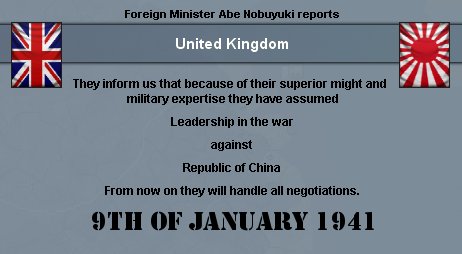
This little spark triggered a true chain-reaction, leading to war in Europe, too.
The German Reich issued declarations of war to Japan, France, and the United Kingdom as well as all other nations in the Allies.
Furthermore, Stalin started to expand and annex Western Europe. This action stirred up old fears of a Soviet invasion amongst the Japanese population, because the Russians were dealing with their Western enemies now.
Yet, the expansion was rather ridiculous, as the Baltic states were giving the Red Army the hell of a fight.

The fighting at the border began immediately after the declaration of war and offered some quick Japanese victories in the south, whereas the Chinese defenders inflicted heavy losses upon the Japanese attackers.
A series of amphibious landings was opened by 1st Kaiyo Gundan. Those marines had been introduced into the IJN just recently and therefore made their debut in the landing at Guangzhou. The goal of this landing was to seize control over one of the most important Chinese ports and, eventually, to expand further into the country, although this was unlikely. Merely, their presence would bind several Chinese divisions in the south, thus keeping them out of combat elsewhere.
Their landing was supported by the IJN Soryu, its escorts and of course its airplanes. The A6M Zero’s were bombing Guangzhou the night before the landing on the 10th and offered air-support during the actual landing.
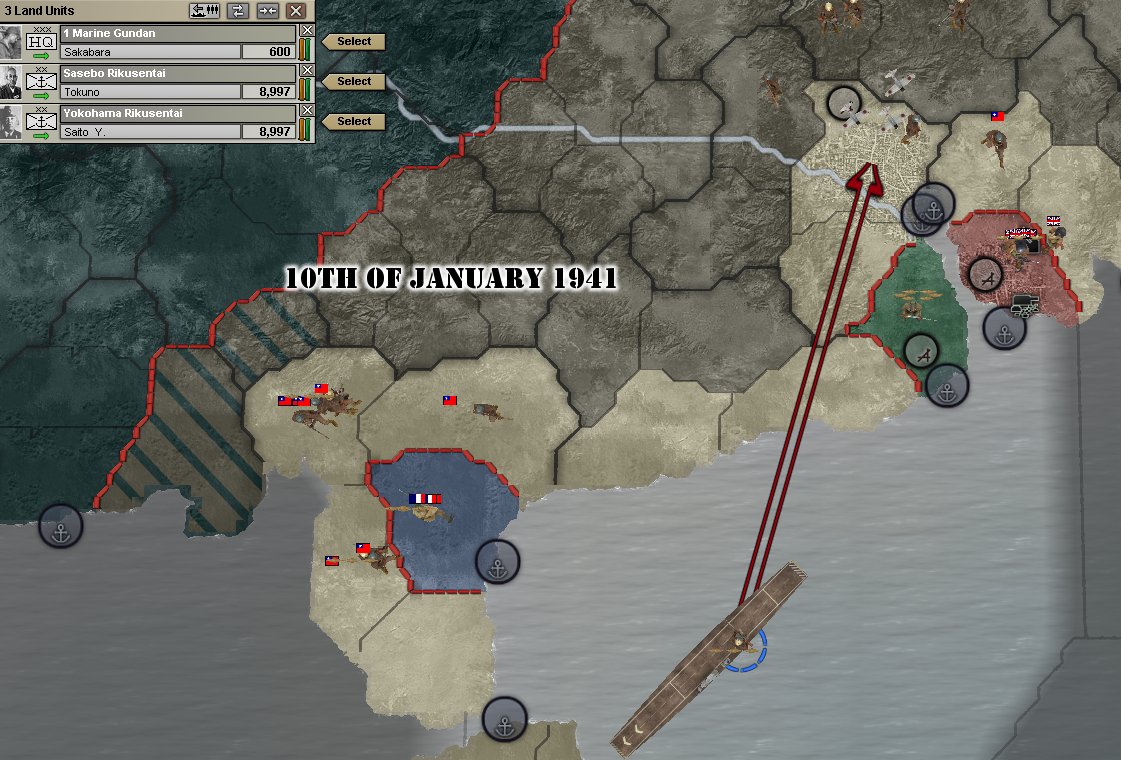
The port was secured the same day and the marines immediately established defensive positions in the city’s outskirts to fend off any Chinese counter-attack.
On the 12th, Takumi’s former unit, the 16th Homengun, landed at an unguarded beach north of Shanghai with the goals of occupying the port as well as making a fast push towards Nanjing, the Chinese capital. The idea of this operation was to capture the city and the Chinese government within the week in order to bring a quick end to the war in Asia.
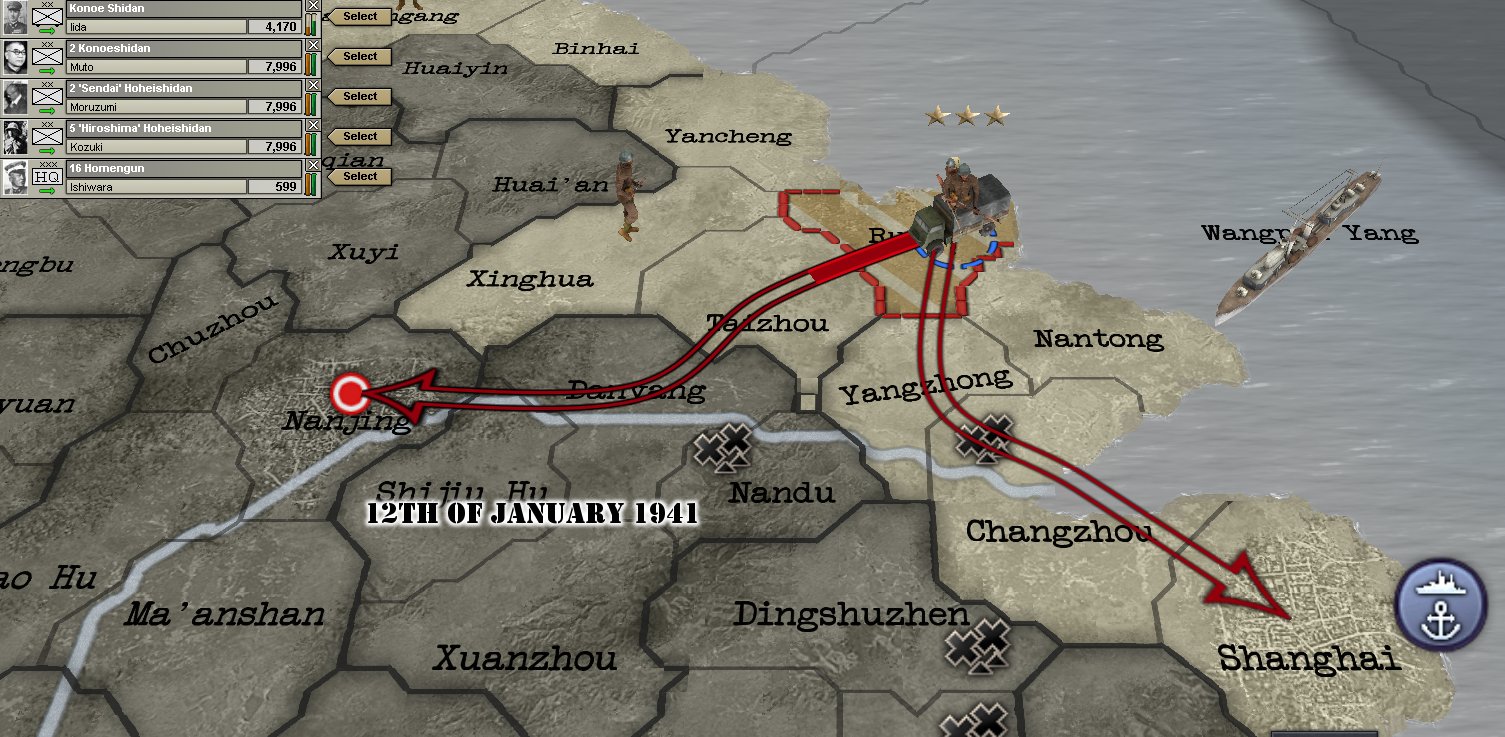
The landing hit the Chinese completely off guard, therefore a motorized division could seize control over Nanjing only two days after the landing. The city was defended by only a few militias that were no real enemy for the IJA, which was also supported by carrier-based airplanes from the IJN Akagi.
The fall of Shanghai would follow one day after.
-----
13th of January 1941
The waves of the salty sea-water were pushing strongly against the landing craft, as if they were playing with it and the men standing within. Some didn’t endure the continuous ups and downs and started to vomit.
Takumi himself couldn’t imagine what it would be like if there was actually some serious resistance from the coast.
Their landing had been pushed back for three days because of bad weather but, during this time, the bombers of the airforce and the mighty guns of the great Japanese battleships had transformed the beach and the lands behind it into a desert out of burned tree-stumps, artillery-craters and ruins of fishing villages. The ports themselves remained undamaged, but they were so small they could barely serve as supply-base for 1 Konoe Gundan.
If there was anything but the mountainous hinterlands that could slow down the advance of the motorized corps, then it had been blown away during the last few days.
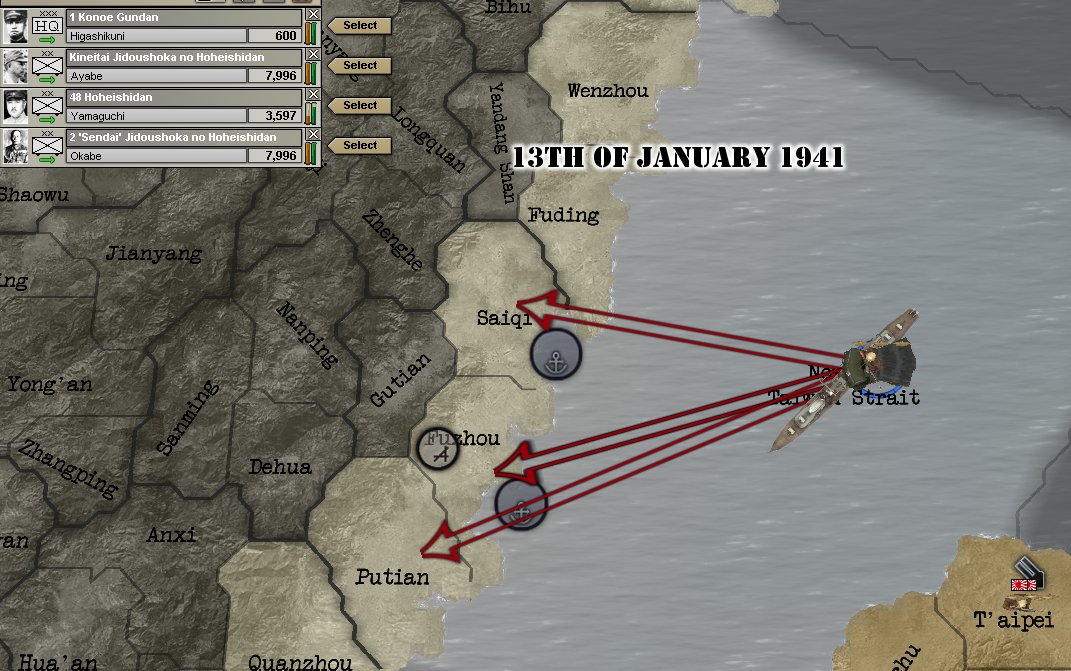
Before they left the harbor, there had been some new technologies and plans to give the IJA an even better edge against China.
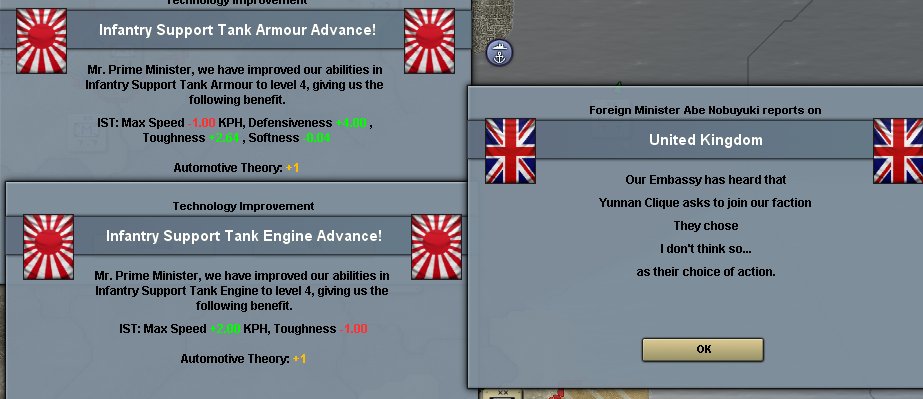
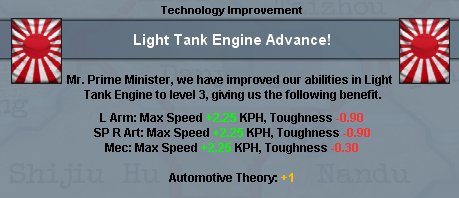
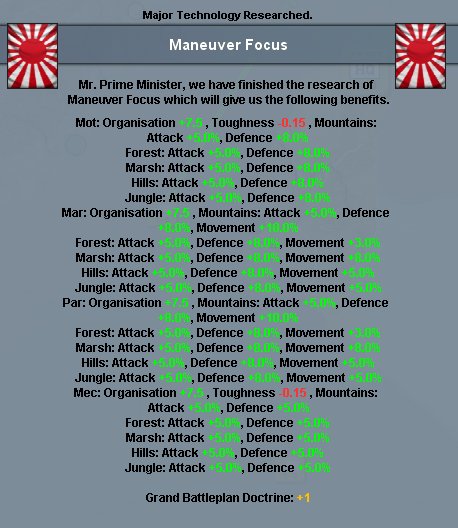
The technological advancements of the recent days were really incredible. He was especially pleased about the improved tactics for the terrain he and his men would have to face.
The landing craft was nearing the coast. Although it was winter, the weather was pretty warm due to the almost sub-tropical climate in the area. This would probably change in the mountains and in the lands behind, but, as of now, he still appreciated the lack of the cold time of the year. The wind carried the smell of smoke, fire and saltpeter.
In short, it was the stench of bombardment paired with the smell of the sea.
“That’s what a victorious amphibious landing smells like!” one of the soldiers in the landing craft shouted enthusiastically.
The others barely gave him a look, and Takumi simply shook his head. The excessive bombing had been but a security measure to eliminate the eventuality of Chinese defenders waiting for them at the beach. This wasn’t the case. If at all, the Chinese would engage them in the mountains, and perhaps not even there.
Takumi looked to his left, where William McFarne stood. He was about as old as Takumi, thus in his mid-twenties. He hailed from the Scottish Highlands, though he was only a half-Scotsman. His mother was British.
The Japanese and British High Command had assigned him to Takumi as a liaison-officer. Before the assignment, he had served in Hongkong. He had married about one year ago, and lived with his wife in Hongkong. Well, at the moment, it was only she who lived there.
He liked the man, he was not very talkative but still good company. Due to his good education, Takumi could speak and understand the English language quite well, but he did have his problems understanding him, though.
Ideally, the Chinese army had its men concentrated in the north, where the bulk of IJA forces was attacking, and in the west, where the Chinese still had to fight the warlords. A small portion of Chinese forces had to hold the south, in which the French as well as the British were slowly but steadily breaking out of their pocket-like colonies, thus demanding an increased Chinese presence in the region. Also, the landing near Shanghai had to be countered.
If all went well, and that was a big if, they would encounter the first Chinese defenders once they were through the mountains.
“Stop talking crap, will ya?” the Scotsman shouted with his deep voice. Takumi grinned as nobody understood these words.
“Care to learn Japanese?” he asked the liaison-officer jokingly.
-----
18th of January 1941
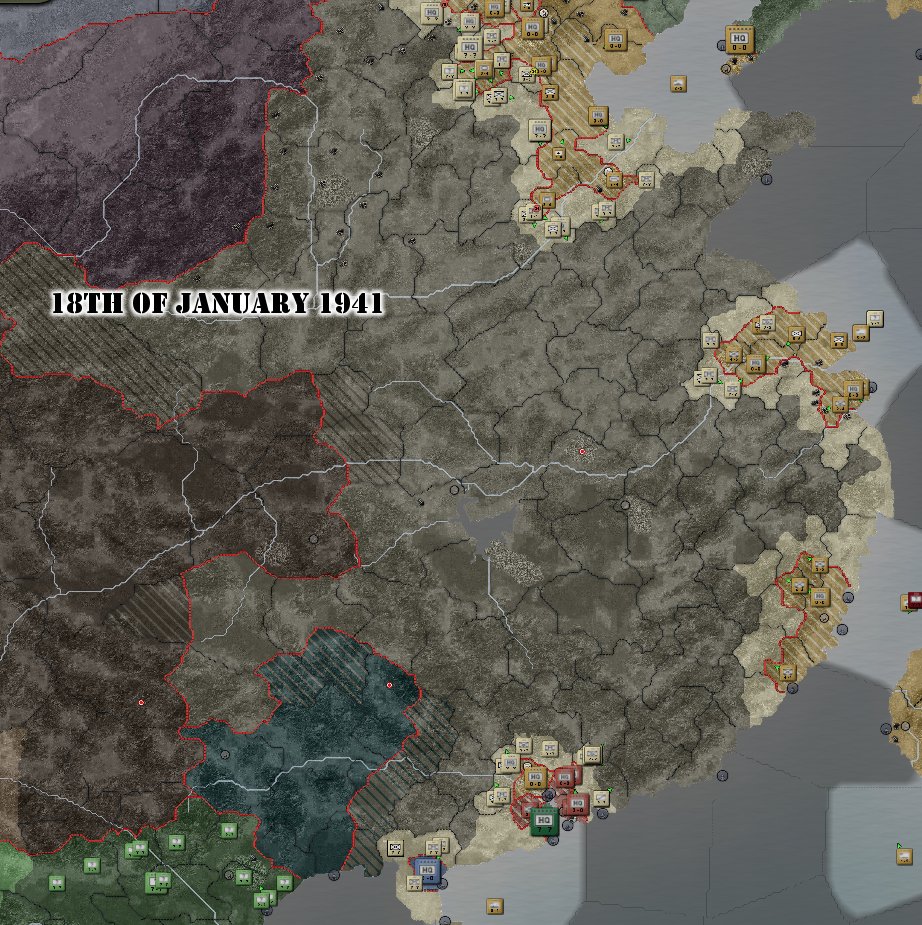
As of now, Takumi and his men had progressed as planned.
In the north, the IJA was still stuck in the west, whereas the eastern wing of the encirclement was in position and had closed up with the paratroopers.
The bad situation led to the abolishment of the idea of a huge encirclement, as the war in the north had basically arrived at a stalemate.
16th Homengun was facing some weak resistance that was made up out of local militias, but it was nothing that could stop them from pushing further into China.
News from the home-front indicated that the Japanese population had appreciated the arrival of confiscated goods from Shanghai and Nanjing. Among them were enough rare materials to refuel the Japanese industry, therefore the war economy of the Empire could evolve its full potential. And because of this, the war had gained a wide support amongst the population, easing the situation of the government.
-----
23rd of January 1941
Takumi opened the envelope.
It carried the sign of the High Command and did most likely contain the latest information on the ongoing of the war and the global happenings.
Considering how far they were in enemy lands by now and the bad terrain, the news did always require some time to reach him.
The United States announced that they requested Japan to make peace with China immediately, as they saw their own interests in Asia threatened.
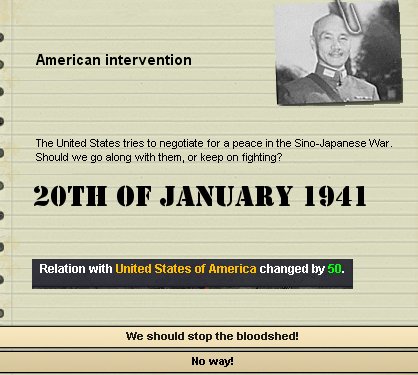
The Empire once again announced that it preferred peace to this conflict, but also insisted that it had had to act before the Chinese became a threat that was too large to be dealt with. The USA, however, didn’t quite accept this reasoning, as they saw their own power threatened.
Also, the Chinese warlords had agreed to an alliance with the Empire. This enabled all parties to increase pressure on China.
The 2nd Sino-Japanese War now lasted for two weeks.
The Japanese had made good progress into Chinese lands, but the increased resistance and the failure to complete operational plans already showed its first signs.
Japanese forces were engaging Chinese resistance everywhere by now, although the Chinese units Takumi encountered were only marching north, they were not prepared to engage Takumi’s men and therefore they were easily wrapped up and defeated.
The same went for 16th Homengun near Nanjing and Shanghai, where the flat terrain favored the partially-motorized divisions even more.
To Takumi, it became obvious that this war would not be one that could be won fast.
On the 25th of December, the Republic of China officially declared war upon the Yunnan and Guangxi Cliques in order to make another step towards the unification of their country. Being an Axis member, they did also call the other Axis-nations to this war.
Japan considered this to be a major threat to its long-term safety.
As China started to expand into the warlord’s countries two day later, the IJA was mobilized and the IJN brought within striking distance of the Chinese coast.
Negotiations with the British and the French had been made to ensure their support.
Together with them, the IJN would hopefully be able to block any overseas trade of China with any other Axis nation and to prevent any potential reinforcements from them.
On the 9th of January, the Empire of Japan officially declared war on the Republic of China to hit them while they were still occupied with the warlords. Neither the Japanese nor the British wanted to wait for the Chinese to become too strong.

This little spark triggered a true chain-reaction, leading to war in Europe, too.
The German Reich issued declarations of war to Japan, France, and the United Kingdom as well as all other nations in the Allies.
Furthermore, Stalin started to expand and annex Western Europe. This action stirred up old fears of a Soviet invasion amongst the Japanese population, because the Russians were dealing with their Western enemies now.
Yet, the expansion was rather ridiculous, as the Baltic states were giving the Red Army the hell of a fight.

The fighting at the border began immediately after the declaration of war and offered some quick Japanese victories in the south, whereas the Chinese defenders inflicted heavy losses upon the Japanese attackers.
A series of amphibious landings was opened by 1st Kaiyo Gundan. Those marines had been introduced into the IJN just recently and therefore made their debut in the landing at Guangzhou. The goal of this landing was to seize control over one of the most important Chinese ports and, eventually, to expand further into the country, although this was unlikely. Merely, their presence would bind several Chinese divisions in the south, thus keeping them out of combat elsewhere.
Their landing was supported by the IJN Soryu, its escorts and of course its airplanes. The A6M Zero’s were bombing Guangzhou the night before the landing on the 10th and offered air-support during the actual landing.

The port was secured the same day and the marines immediately established defensive positions in the city’s outskirts to fend off any Chinese counter-attack.
On the 12th, Takumi’s former unit, the 16th Homengun, landed at an unguarded beach north of Shanghai with the goals of occupying the port as well as making a fast push towards Nanjing, the Chinese capital. The idea of this operation was to capture the city and the Chinese government within the week in order to bring a quick end to the war in Asia.

The landing hit the Chinese completely off guard, therefore a motorized division could seize control over Nanjing only two days after the landing. The city was defended by only a few militias that were no real enemy for the IJA, which was also supported by carrier-based airplanes from the IJN Akagi.
The fall of Shanghai would follow one day after.
-----
13th of January 1941
The waves of the salty sea-water were pushing strongly against the landing craft, as if they were playing with it and the men standing within. Some didn’t endure the continuous ups and downs and started to vomit.
Takumi himself couldn’t imagine what it would be like if there was actually some serious resistance from the coast.
Their landing had been pushed back for three days because of bad weather but, during this time, the bombers of the airforce and the mighty guns of the great Japanese battleships had transformed the beach and the lands behind it into a desert out of burned tree-stumps, artillery-craters and ruins of fishing villages. The ports themselves remained undamaged, but they were so small they could barely serve as supply-base for 1 Konoe Gundan.
If there was anything but the mountainous hinterlands that could slow down the advance of the motorized corps, then it had been blown away during the last few days.

Before they left the harbor, there had been some new technologies and plans to give the IJA an even better edge against China.



The technological advancements of the recent days were really incredible. He was especially pleased about the improved tactics for the terrain he and his men would have to face.
The landing craft was nearing the coast. Although it was winter, the weather was pretty warm due to the almost sub-tropical climate in the area. This would probably change in the mountains and in the lands behind, but, as of now, he still appreciated the lack of the cold time of the year. The wind carried the smell of smoke, fire and saltpeter.
In short, it was the stench of bombardment paired with the smell of the sea.
“That’s what a victorious amphibious landing smells like!” one of the soldiers in the landing craft shouted enthusiastically.
The others barely gave him a look, and Takumi simply shook his head. The excessive bombing had been but a security measure to eliminate the eventuality of Chinese defenders waiting for them at the beach. This wasn’t the case. If at all, the Chinese would engage them in the mountains, and perhaps not even there.
Takumi looked to his left, where William McFarne stood. He was about as old as Takumi, thus in his mid-twenties. He hailed from the Scottish Highlands, though he was only a half-Scotsman. His mother was British.
The Japanese and British High Command had assigned him to Takumi as a liaison-officer. Before the assignment, he had served in Hongkong. He had married about one year ago, and lived with his wife in Hongkong. Well, at the moment, it was only she who lived there.
He liked the man, he was not very talkative but still good company. Due to his good education, Takumi could speak and understand the English language quite well, but he did have his problems understanding him, though.
Ideally, the Chinese army had its men concentrated in the north, where the bulk of IJA forces was attacking, and in the west, where the Chinese still had to fight the warlords. A small portion of Chinese forces had to hold the south, in which the French as well as the British were slowly but steadily breaking out of their pocket-like colonies, thus demanding an increased Chinese presence in the region. Also, the landing near Shanghai had to be countered.
If all went well, and that was a big if, they would encounter the first Chinese defenders once they were through the mountains.
“Stop talking crap, will ya?” the Scotsman shouted with his deep voice. Takumi grinned as nobody understood these words.
“Care to learn Japanese?” he asked the liaison-officer jokingly.
-----
18th of January 1941

As of now, Takumi and his men had progressed as planned.
In the north, the IJA was still stuck in the west, whereas the eastern wing of the encirclement was in position and had closed up with the paratroopers.
The bad situation led to the abolishment of the idea of a huge encirclement, as the war in the north had basically arrived at a stalemate.
16th Homengun was facing some weak resistance that was made up out of local militias, but it was nothing that could stop them from pushing further into China.
News from the home-front indicated that the Japanese population had appreciated the arrival of confiscated goods from Shanghai and Nanjing. Among them were enough rare materials to refuel the Japanese industry, therefore the war economy of the Empire could evolve its full potential. And because of this, the war had gained a wide support amongst the population, easing the situation of the government.
-----
23rd of January 1941
Takumi opened the envelope.
It carried the sign of the High Command and did most likely contain the latest information on the ongoing of the war and the global happenings.
Considering how far they were in enemy lands by now and the bad terrain, the news did always require some time to reach him.
The United States announced that they requested Japan to make peace with China immediately, as they saw their own interests in Asia threatened.

The Empire once again announced that it preferred peace to this conflict, but also insisted that it had had to act before the Chinese became a threat that was too large to be dealt with. The USA, however, didn’t quite accept this reasoning, as they saw their own power threatened.
Also, the Chinese warlords had agreed to an alliance with the Empire. This enabled all parties to increase pressure on China.
The 2nd Sino-Japanese War now lasted for two weeks.
The Japanese had made good progress into Chinese lands, but the increased resistance and the failure to complete operational plans already showed its first signs.
Japanese forces were engaging Chinese resistance everywhere by now, although the Chinese units Takumi encountered were only marching north, they were not prepared to engage Takumi’s men and therefore they were easily wrapped up and defeated.
The same went for 16th Homengun near Nanjing and Shanghai, where the flat terrain favored the partially-motorized divisions even more.
To Takumi, it became obvious that this war would not be one that could be won fast.
What did the Chinese say to the US Intervention?
Nothing.
I was actually quite surprised that there was an "American Intervention"-event, but no reaction from the Chinese thereafter or a reaction by the US as the fighting continued.
Nothing.
I was actually quite surprised that there was an "American Intervention"-event, but no reaction from the Chinese thereafter or a reaction by the US as the fighting continued.
The reaction events are not marked as major, so you will only see them if you turn on the popup or logging of every event. (Which is intentional, as otherwise you could decide what to do based on what the AI does.) If you both agree to stop the war, then the US will get a decision to force you to return to the pre-war borders (except for the possible expansion of Mengjiang or the Jingwei Regime), but it won't end the Chinese consolidation war!
Actually, in this scenario I would have decided to give the finger to the USA. Screw their "interests", it is self-preservance!
The Chinese AI is simply pathetic. It didn't guard its ports at all and it even left its capital virtually undefended...
American intervention is an interesting event, but what are its effects?
American intervention is an interesting event, but what are its effects?
I like the operational plan - China has so many problems to try to deal with. Yes, it is disappointing the AI didn't defend Nanjing and Shanghai, and it's not as though China is short of units. Having said that, China's current preoccupation with the warlords makes this a perfect time to strike.
The rebuff to the USA is unfortunate but let's hope it doesn't escalate!
How are things going in Europe?
The rebuff to the USA is unfortunate but let's hope it doesn't escalate!
How are things going in Europe?
Thanks for the comments!
I have all events switched on.
Of course it is self-preservance, but, on the other hand, the USA are an important trading-partner of mine.
Therfore, I went with the first option and had it represent the government saying: "Well, they expand and we are threatened. We were forced into this war, but we didn't want it."
To be honest, it took quite some time for any resistance in the south to arise (except for the areas around the French and English colonies).
I think the AI couldn't deal with the sheer amount of fronts anymore.
For me, the effects were a better relationwith the USA, but, otherwise, I didn't find any consequences. Slan wrote about the event in his post, and I think the effects of this are maybe tied to Japan still being an autocracy or an Axis-member.
So far, the tensions with the USA are far from escalating, though it might seem close sometimes.
The Reich is pushing westwards wince the beginning of the Second Sino-Japanese War and, so far, it's not really a Blitzkrieg, merely a Sitzkrieg (the German term for the Reich and the Frensh watching each other at the Siegfried line and neither attacking).
Garmany has decared war on the BeNeLux states, but, so far, has only made minor advances. In fact, the Wehrmacht was beaten back at Amsterdam several times. I'm sure the Führer's not amused at how his armeis are doing.
The bad performance in the west might also be caused by the independent Czechoslovakia. The german border to this state is heavily guarded and draining several divisions from the Western front.
The reaction events are not marked as major, so you will only see them if you turn on the popup or logging of every event. (Which is intentional, as otherwise you could decide what to do based on what the AI does.) If you both agree to stop the war, then the US will get a decision to force you to return to the pre-war borders (except for the possible expansion of Mengjiang or the Jingwei Regime), but it won't end the Chinese consolidation war!
Actually, in this scenario I would have decided to give the finger to the USA. Screw their "interests", it is self-preservance!
I have all events switched on.
Of course it is self-preservance, but, on the other hand, the USA are an important trading-partner of mine.
Therfore, I went with the first option and had it represent the government saying: "Well, they expand and we are threatened. We were forced into this war, but we didn't want it."
The Chinese AI is simply pathetic. It didn't guard its ports at all and it even left its capital virtually undefended...
American intervention is an interesting event, but what are its effects?
To be honest, it took quite some time for any resistance in the south to arise (except for the areas around the French and English colonies).
I think the AI couldn't deal with the sheer amount of fronts anymore.
For me, the effects were a better relationwith the USA, but, otherwise, I didn't find any consequences. Slan wrote about the event in his post, and I think the effects of this are maybe tied to Japan still being an autocracy or an Axis-member.
I like the operational plan - China has so many problems to try to deal with. Yes, it is disappointing the AI didn't defend Nanjing and Shanghai, and it's not as though China is short of units. Having said that, China's current preoccupation with the warlords makes this a perfect time to strike.
The rebuff to the USA is unfortunate but let's hope it doesn't escalate!
How are things going in Europe?
So far, the tensions with the USA are far from escalating, though it might seem close sometimes.
The Reich is pushing westwards wince the beginning of the Second Sino-Japanese War and, so far, it's not really a Blitzkrieg, merely a Sitzkrieg (the German term for the Reich and the Frensh watching each other at the Siegfried line and neither attacking).
Garmany has decared war on the BeNeLux states, but, so far, has only made minor advances. In fact, the Wehrmacht was beaten back at Amsterdam several times. I'm sure the Führer's not amused at how his armeis are doing.
The bad performance in the west might also be caused by the independent Czechoslovakia. The german border to this state is heavily guarded and draining several divisions from the Western front.
Chapter 15
25th of January
The shooting was loud and confusing.
Takumi’s unit had met a group of peasants that carried old guns and opposed them in the mountains. As they were locals, they had known some secret passages or whatever and did therefore appear almost out of nowhere.
This had just happened. The soldiers left the truck, accompanied by some rough swearing from McFarne. He also issued some simple orders, as he had started to learn Japanese with Takumi’s help after the landing. The fight was not as it had been in Russia, for in Russia, their intelligence had been better and therefore they knew when they would be attacked. This time, however, there was no information about such ambushes.
Takumi threw himself onto the ground of the road, unlocking his gun and providing some covering fire for the rest of the soldiers.
The militia wasn’t organized very well. Had those attacks come all at once, they would have dealt some serious damage. But the assaults were only sporadic and easily dealt with. All they did was slowing them down. The battle lasted for about twenty minutes. The militia didn’t hold their stand much longer. The results were three wounded Japanese soldiers and some bullet-holes in the trucks.
According to High Command, they were on time and progressing well. Encouraged by the early successes in the coastal region of China, a motorized division of 16th Homengun was to perform what would later be called the “Wuhan Push”. The idea was to drive a wedge deep into the Chinese hinterlands. Takumi and the division in which he served were scheduled to reach Wuhan in early February, thus unifying with 16th Homengun and then leaving again, as they would clear out the south-west and 16th Homengun would move north.
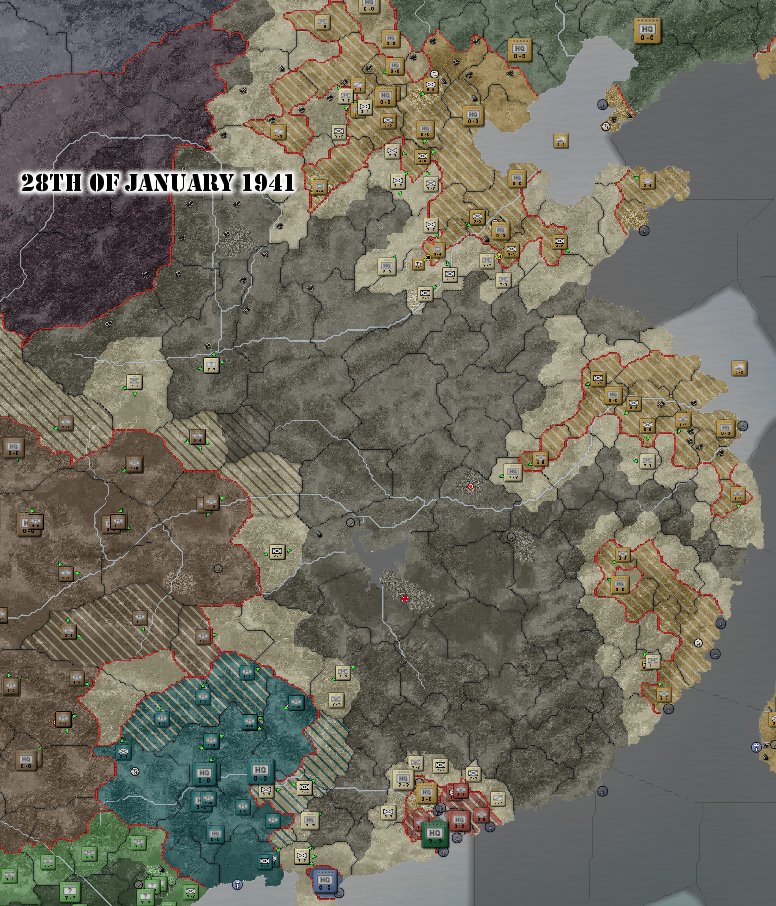
In the north, a tank division had managed to get behind the Chinese while they were being split into several smaller encirclements. The division was to use its speed in order to gain control over the highly fortified mountains that once belonged to the communists before the Chinese could occupy them.
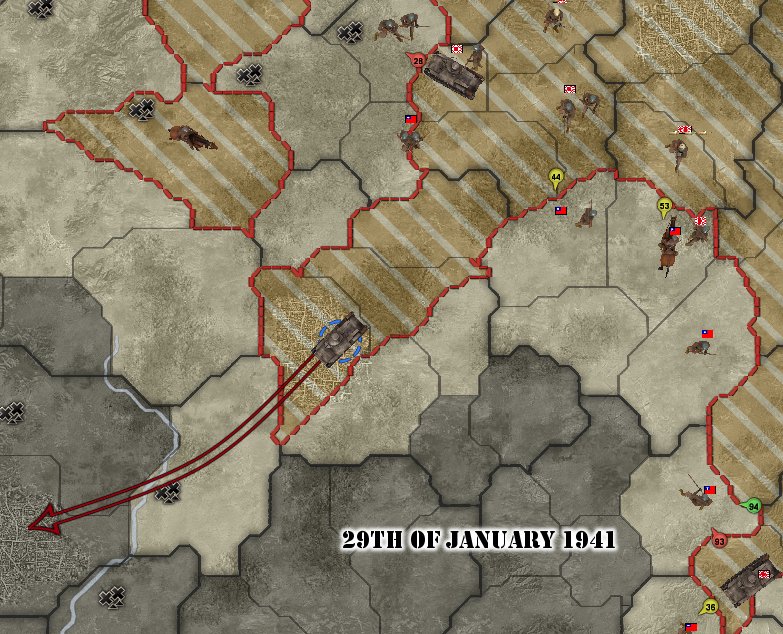
The stalemate in the north-east had been resolved by the 1st Hohei Gundan, a cavalry corps that had managed to surround the Chinese and caused lots of trouble in their lines.
-----
4th of February 1941
Haruji was stunned by the news from the front.
Not only did the IJA sweep mercilessly through the badly-armed defenders, but they did also suffer only a few casualties.
Peace in Asia became ever more likely, as the territory of one of the Chinese warlords had also been recognized as a legitimate state and was accepted into the Allies four days ago.
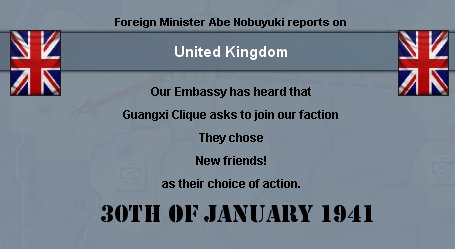
He felt that, currently, things were going quite well for the Empire. It was obviously winning the war in China and the rare material crisis had also been solved successfully because of those conquests.
The newspaper did always print old maps of the frontline in order to avoid revealing too much about the happenings in the war, as there might always be spies reading, too.
Today’s map was dated for the 1st of February, the day after the successful conquest of Wuhan. It seemed as if the other divisions had been held back by Chinese forces or other problems, but the division in Wuhan was now under threat of being cut off.
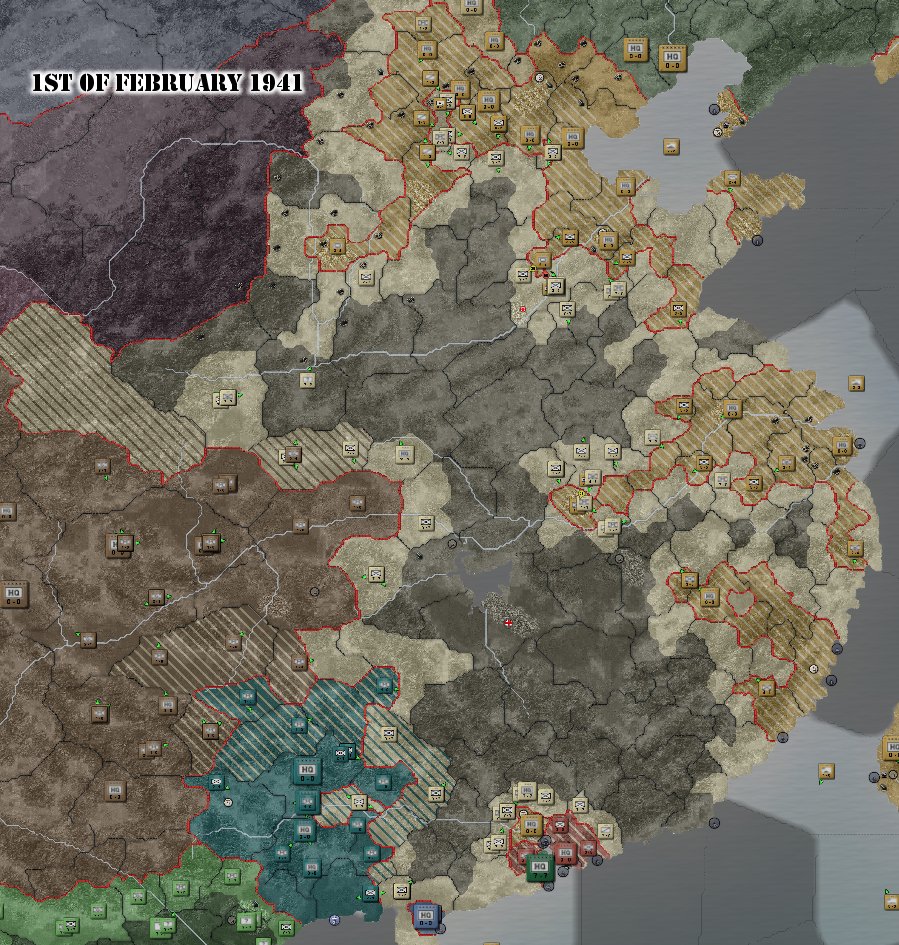
To be honest, today was a day on which neither Haruji nor any other civilian did really care about the war.
Today was the day of the second elections since the establishment of democracy in Japan.
It was the second opportunity for the people to raise its voice. Although the market-liberal Minsei Party became the strongest power in the parliament, they could not rule on their own and did therefore have to form a coalition-government with the social-conservatist party.
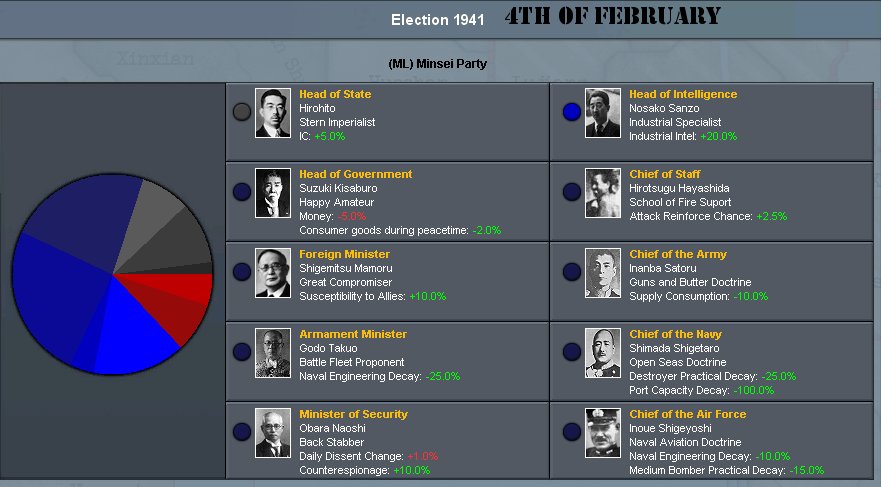
The recent successes in the war had brought a lot of popularity to the old government and the population apparently forgot about all its problems and earlier mistakes. The new government immediately found itself challenged by having to fight a global conflict.
-----
6th of February 1941
“Faster! Faster! Press the attack, damnit!” Takumi shouted.
“They are retreating and we cannot afford waiting any longer! There’s Japanese lives to be saved!”
“We’re on the move already, but we’ll need time to build up some bridges of that river ahead of us!” exclaimed an engineer- sergeant nearby. He didn’t belong to Takumi’s unit and he couldn’t see his name-sign, but their advance had been chaotic after the conquest of Nanhung two days ago.
Takumi cursed, but knew the man was right.
Without the bridges, the trucks and the heavy guns would sink into the ground below the surface of the crossing, thus ripping the divisin of its most important parts and making them easy prey for the Chinese.
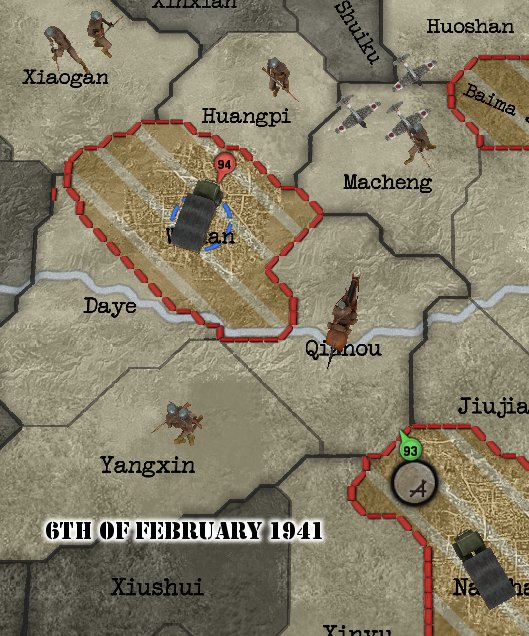
Wuhan had been cut off and, with no airfield in the town, it had become impossible to supply the division trapped within.
Therefore, 1st Konoe Gundan was sent out to relieve the siege. The airforce was already flying bombing runs on the attackers day and night, Takumi could hear the sound of bombs and saw large piles of smoke rising at the horizon. There must be Wuhan, he thought.
Obviously, the move that was supposed to finally decide the war had already become its greatest disaster.
As they crossed the river at night, it was already too late.
Wuhan had been taken by the Chinese. The town and its surroundings had become a huge graveyard with 5,000 Japanese killed or missed and about 7,000 dead Chinese attackers. The victims of the Japanese bombardments are unknown.
The rest of the division, about another 5,000 men, surrendered to the Chinese. The public was shocked by the loss of a whole motorized division. High Command hadn’t expected the Chinese Army to remove so many units from the northern front, so that the divisions that followed the push would have to halt for so long.
In the next few days, the Yunnan-warlord and Greece joined the Allies.
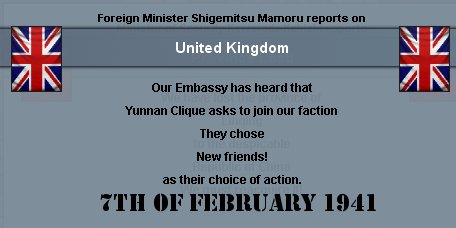
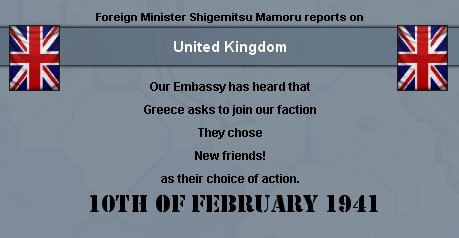
Also, the last Chinese port had recently been occupied by Japanese soldiers. Thus, no reinforcements or goods from the outside could reach China any more, as it was completely surrounded by enemies.
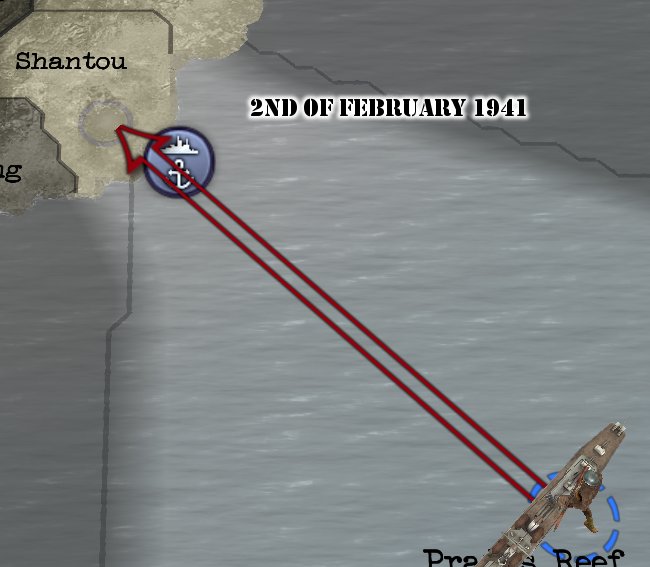
Takumi did barely care for those news, as good as they might be. Immediately after its fall, Wuhan was once more under Japanese attack. The battle raged for four days now, and the end had yet to come. Due to massive air-superiority, the IJA made significant gains, but the Chinese had obtained the defensive positions and heavy weapons of the old Japanese defenders.
The fighting was tough and tore at their nerves. McFarne was continuously swearing, by now partly in Japanese and English. Takumi didn’t answer letters from Misaki, he only wrote her that he was alive and well and missing her. He didn’t find the power for more, and he didn’t want to think about how he missed her.
Wuhan finally fell on the 14th of February. The raging battles had made the town a field of corpses and ruins. Still, Takumi pushed his men onward to follow the last Chinese defenders in order to eliminate the last elements of the Chinese Army in the region.
By now, the last elements of the 16th Homengun had also arrived in town.
The British and the French started large campaigns in the south on the 21st of February. Thus, the war in the south was over.
The sudden expansion was probably triggered by the annexation of Luxembourg.
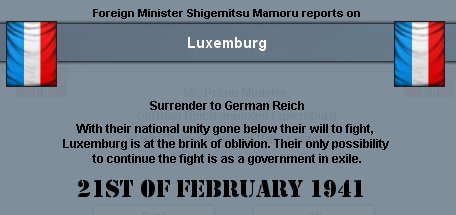
The German Reich advanced slowly yet steadily into Western Europe. The neutral BeNeLux-states were under attack of the Wehrmacht since the 9th of January, and Luxembourg was the first to fall.
-----
24th of February 1941
What followed was occupying village after village in search of some resistance.
Instead, they found villages filled with women, children and old people. This was definitely a consequence of the numerous wars that China had fought during the last years.
Wives without husbands, children without fathers.
One day, as the unit was resting in a village, the soldiers were being watched by several young children. Although they suffered starvation and were probably always told that the Japanese are their worst enemies, they didn’t behave any different than as if the foreign soldiers were friends coming over for tea. The adults were glaring at the soldiers, yet the children didn’t seem to mind their presence.
They only shrieked back as McFarne brought a huge lunch-package from one of the trucks and wanted to give it to them. As he approached them with the package, they turned and ran, hiding behind houses or amidst carts and crates. Takumi smiled and went to McFarne.
Together, they opened the package and showed its contents to the children. There was water, bread cooked vegetables and several other goods, all packed in a way that they didn’t go bad.
It took some time, but, eventually, one of the children found the courage to approach them and take some bread from Takumi’s hands.
The division’s war-photographer did immediately take a picture of this moment, which would probably be used for propaganda later on, but Takumi didn’t care about this.
After all this bloodshed, he had finally the feeling of doing something good again.
The last battle of the war that deserved this term was fought in the north from the 24th to the 28th of February, leading to the encirclement of the last few Chinese defenders in the north.
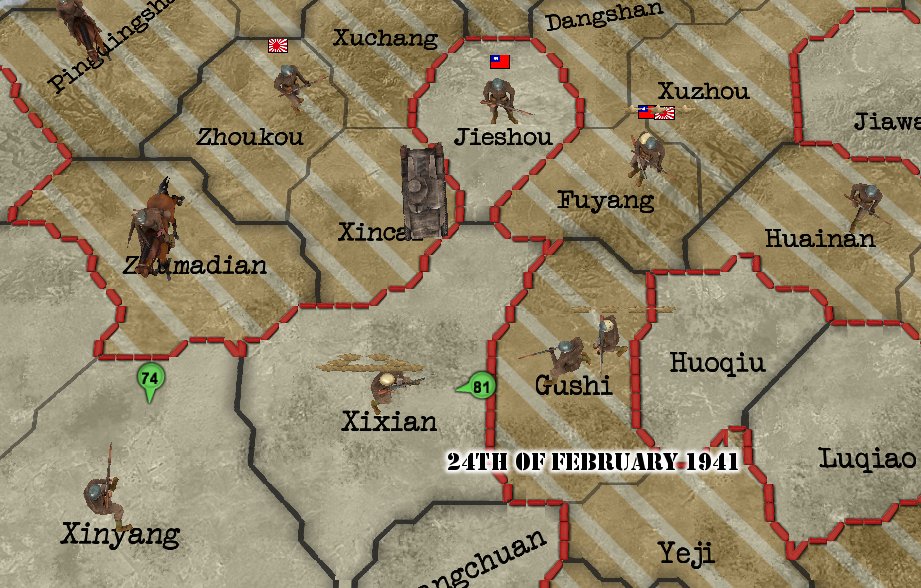
It was an easy battle, as the defenders were already starved out and lacked supplies. Still, the sheer amount of space that was taken over by the “Battle of the Northern Encirclements” made it last four days.
On the 3rd of March, the United Kingdom announced a new Prime Minister, Winston Churchill, which was dryly commented by McFarne who said “Englishman is Englishman. One’s like the other. They lack the fire in their eyes. We’d need us some Scottish Prime Minister. Then we’d clean the floor in the Reichstag with Hitler’s moustache in no time, I tell ya!”
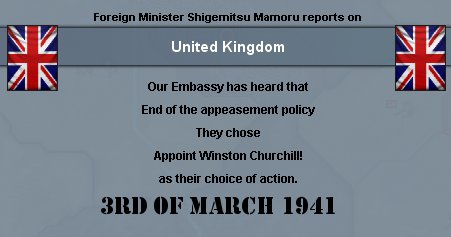
It still took almost a week for the Chinese to accept their absolute defeat.
On the 9th of March, the Republic of China surrendered without conditions to the Empire of Japan.
This marked the end of the Second Sino-Japanese War as well as the end of the war in Asia.
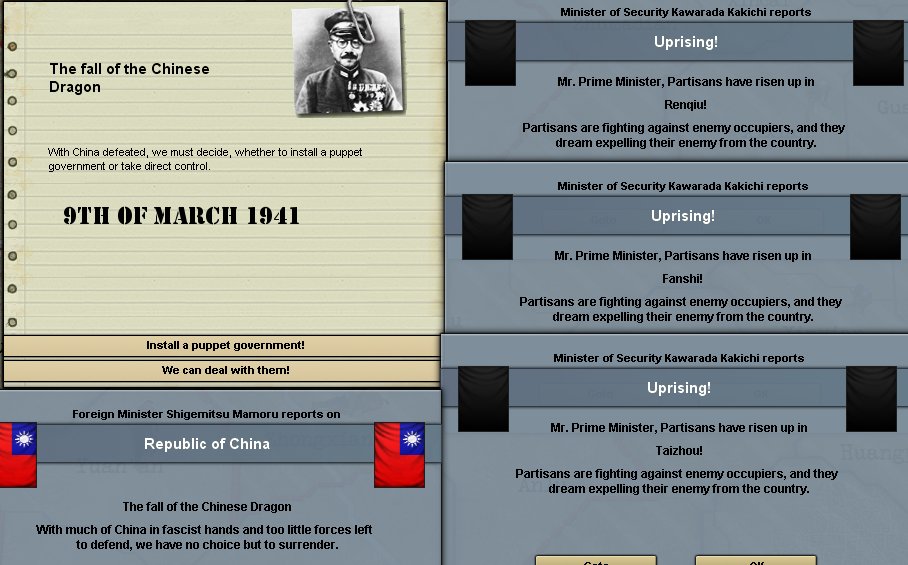
The few uprisings were quickly dealt with.
What followed was the establishment of a Chinese state under Japanese influence and protection. The Empire was afraid that the Chinese might once more rise up against them, and so they demanded at least an indirect control over China.
It was obvious that they would be moved to Europe during the next few months, but first, Takumi had taken a leave so that he could marry the woman he loved.
25th of January
The shooting was loud and confusing.
Takumi’s unit had met a group of peasants that carried old guns and opposed them in the mountains. As they were locals, they had known some secret passages or whatever and did therefore appear almost out of nowhere.
This had just happened. The soldiers left the truck, accompanied by some rough swearing from McFarne. He also issued some simple orders, as he had started to learn Japanese with Takumi’s help after the landing. The fight was not as it had been in Russia, for in Russia, their intelligence had been better and therefore they knew when they would be attacked. This time, however, there was no information about such ambushes.
Takumi threw himself onto the ground of the road, unlocking his gun and providing some covering fire for the rest of the soldiers.
The militia wasn’t organized very well. Had those attacks come all at once, they would have dealt some serious damage. But the assaults were only sporadic and easily dealt with. All they did was slowing them down. The battle lasted for about twenty minutes. The militia didn’t hold their stand much longer. The results were three wounded Japanese soldiers and some bullet-holes in the trucks.
According to High Command, they were on time and progressing well. Encouraged by the early successes in the coastal region of China, a motorized division of 16th Homengun was to perform what would later be called the “Wuhan Push”. The idea was to drive a wedge deep into the Chinese hinterlands. Takumi and the division in which he served were scheduled to reach Wuhan in early February, thus unifying with 16th Homengun and then leaving again, as they would clear out the south-west and 16th Homengun would move north.

In the north, a tank division had managed to get behind the Chinese while they were being split into several smaller encirclements. The division was to use its speed in order to gain control over the highly fortified mountains that once belonged to the communists before the Chinese could occupy them.

The stalemate in the north-east had been resolved by the 1st Hohei Gundan, a cavalry corps that had managed to surround the Chinese and caused lots of trouble in their lines.
-----
4th of February 1941
Haruji was stunned by the news from the front.
Not only did the IJA sweep mercilessly through the badly-armed defenders, but they did also suffer only a few casualties.
Peace in Asia became ever more likely, as the territory of one of the Chinese warlords had also been recognized as a legitimate state and was accepted into the Allies four days ago.

He felt that, currently, things were going quite well for the Empire. It was obviously winning the war in China and the rare material crisis had also been solved successfully because of those conquests.
The newspaper did always print old maps of the frontline in order to avoid revealing too much about the happenings in the war, as there might always be spies reading, too.
Today’s map was dated for the 1st of February, the day after the successful conquest of Wuhan. It seemed as if the other divisions had been held back by Chinese forces or other problems, but the division in Wuhan was now under threat of being cut off.

To be honest, today was a day on which neither Haruji nor any other civilian did really care about the war.
Today was the day of the second elections since the establishment of democracy in Japan.
It was the second opportunity for the people to raise its voice. Although the market-liberal Minsei Party became the strongest power in the parliament, they could not rule on their own and did therefore have to form a coalition-government with the social-conservatist party.

The recent successes in the war had brought a lot of popularity to the old government and the population apparently forgot about all its problems and earlier mistakes. The new government immediately found itself challenged by having to fight a global conflict.
-----
6th of February 1941
“Faster! Faster! Press the attack, damnit!” Takumi shouted.
“They are retreating and we cannot afford waiting any longer! There’s Japanese lives to be saved!”
“We’re on the move already, but we’ll need time to build up some bridges of that river ahead of us!” exclaimed an engineer- sergeant nearby. He didn’t belong to Takumi’s unit and he couldn’t see his name-sign, but their advance had been chaotic after the conquest of Nanhung two days ago.
Takumi cursed, but knew the man was right.
Without the bridges, the trucks and the heavy guns would sink into the ground below the surface of the crossing, thus ripping the divisin of its most important parts and making them easy prey for the Chinese.

Wuhan had been cut off and, with no airfield in the town, it had become impossible to supply the division trapped within.
Therefore, 1st Konoe Gundan was sent out to relieve the siege. The airforce was already flying bombing runs on the attackers day and night, Takumi could hear the sound of bombs and saw large piles of smoke rising at the horizon. There must be Wuhan, he thought.
Obviously, the move that was supposed to finally decide the war had already become its greatest disaster.
As they crossed the river at night, it was already too late.
Wuhan had been taken by the Chinese. The town and its surroundings had become a huge graveyard with 5,000 Japanese killed or missed and about 7,000 dead Chinese attackers. The victims of the Japanese bombardments are unknown.
The rest of the division, about another 5,000 men, surrendered to the Chinese. The public was shocked by the loss of a whole motorized division. High Command hadn’t expected the Chinese Army to remove so many units from the northern front, so that the divisions that followed the push would have to halt for so long.
In the next few days, the Yunnan-warlord and Greece joined the Allies.


Also, the last Chinese port had recently been occupied by Japanese soldiers. Thus, no reinforcements or goods from the outside could reach China any more, as it was completely surrounded by enemies.

Takumi did barely care for those news, as good as they might be. Immediately after its fall, Wuhan was once more under Japanese attack. The battle raged for four days now, and the end had yet to come. Due to massive air-superiority, the IJA made significant gains, but the Chinese had obtained the defensive positions and heavy weapons of the old Japanese defenders.
The fighting was tough and tore at their nerves. McFarne was continuously swearing, by now partly in Japanese and English. Takumi didn’t answer letters from Misaki, he only wrote her that he was alive and well and missing her. He didn’t find the power for more, and he didn’t want to think about how he missed her.
Wuhan finally fell on the 14th of February. The raging battles had made the town a field of corpses and ruins. Still, Takumi pushed his men onward to follow the last Chinese defenders in order to eliminate the last elements of the Chinese Army in the region.
By now, the last elements of the 16th Homengun had also arrived in town.
The British and the French started large campaigns in the south on the 21st of February. Thus, the war in the south was over.
The sudden expansion was probably triggered by the annexation of Luxembourg.

The German Reich advanced slowly yet steadily into Western Europe. The neutral BeNeLux-states were under attack of the Wehrmacht since the 9th of January, and Luxembourg was the first to fall.
-----
24th of February 1941
What followed was occupying village after village in search of some resistance.
Instead, they found villages filled with women, children and old people. This was definitely a consequence of the numerous wars that China had fought during the last years.
Wives without husbands, children without fathers.
One day, as the unit was resting in a village, the soldiers were being watched by several young children. Although they suffered starvation and were probably always told that the Japanese are their worst enemies, they didn’t behave any different than as if the foreign soldiers were friends coming over for tea. The adults were glaring at the soldiers, yet the children didn’t seem to mind their presence.
They only shrieked back as McFarne brought a huge lunch-package from one of the trucks and wanted to give it to them. As he approached them with the package, they turned and ran, hiding behind houses or amidst carts and crates. Takumi smiled and went to McFarne.
Together, they opened the package and showed its contents to the children. There was water, bread cooked vegetables and several other goods, all packed in a way that they didn’t go bad.
It took some time, but, eventually, one of the children found the courage to approach them and take some bread from Takumi’s hands.
The division’s war-photographer did immediately take a picture of this moment, which would probably be used for propaganda later on, but Takumi didn’t care about this.
After all this bloodshed, he had finally the feeling of doing something good again.
The last battle of the war that deserved this term was fought in the north from the 24th to the 28th of February, leading to the encirclement of the last few Chinese defenders in the north.

It was an easy battle, as the defenders were already starved out and lacked supplies. Still, the sheer amount of space that was taken over by the “Battle of the Northern Encirclements” made it last four days.
On the 3rd of March, the United Kingdom announced a new Prime Minister, Winston Churchill, which was dryly commented by McFarne who said “Englishman is Englishman. One’s like the other. They lack the fire in their eyes. We’d need us some Scottish Prime Minister. Then we’d clean the floor in the Reichstag with Hitler’s moustache in no time, I tell ya!”

It still took almost a week for the Chinese to accept their absolute defeat.
On the 9th of March, the Republic of China surrendered without conditions to the Empire of Japan.
This marked the end of the Second Sino-Japanese War as well as the end of the war in Asia.

The few uprisings were quickly dealt with.
What followed was the establishment of a Chinese state under Japanese influence and protection. The Empire was afraid that the Chinese might once more rise up against them, and so they demanded at least an indirect control over China.
It was obvious that they would be moved to Europe during the next few months, but first, Takumi had taken a leave so that he could marry the woman he loved.
You didn't specify, but I'm assuming you went with the Puppet State (given the "indirect control" over China)?
Only two months to subdue China? Quick work!
From the look of your election result, would I be right in thinking you haven't got many Market Liberal ministers to choose from?
And I've just been looking at China's progress in my last test. Although they hadn't got any convoys operating for obvious reasons, they were still managing to acquire the resources they wanted by land (even from distant countries such as Saudi Arabia), so I wouldn't be surprised if your naval blockade was less effective than you hoped.
From the look of your election result, would I be right in thinking you haven't got many Market Liberal ministers to choose from?
And I've just been looking at China's progress in my last test. Although they hadn't got any convoys operating for obvious reasons, they were still managing to acquire the resources they wanted by land (even from distant countries such as Saudi Arabia), so I wouldn't be surprised if your naval blockade was less effective than you hoped.
You didn't specify, but I'm assuming you went with the Puppet State (given the "indirect control" over China)?
I wrote that: "establishment of a Chinese state under Japanese influence and protection"
Only two months to subdue China? Quick work!
From the look of your election result, would I be right in thinking you haven't got many Market Liberal ministers to choose from?
And I've just been looking at China's progress in my last test. Although they hadn't got any convoys operating for obvious reasons, they were still managing to acquire the resources they wanted by land (even from distant countries such as Saudi Arabia), so I wouldn't be surprised if your naval blockade was less effective than you hoped.
I'm not so sure about that. China was de facto surrounded by nations it was at war with, so the only way goods could get into China was by air.
The market liberal ministers aren't indeed very many, but I had actually thought that there would be some market liberal ministers appearing after the election.

